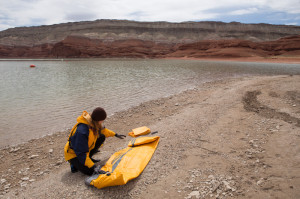 I’ve always wanted a kayak, but in Chicago, it doesn’t make a whole lot of sense. Although I took whitewater classes a few years ago and I’ve paddled around my fair share of waterways, I’m not the most experienced kayaker either. So when I bought an inflatable one with REI dividends, I had no idea what I was getting myself into.
I’ve always wanted a kayak, but in Chicago, it doesn’t make a whole lot of sense. Although I took whitewater classes a few years ago and I’ve paddled around my fair share of waterways, I’m not the most experienced kayaker either. So when I bought an inflatable one with REI dividends, I had no idea what I was getting myself into.
 The weapon of choice was the Friday Harbor Adventure Tandem Inflatable Kayak…primarily, because it was only $199.95. And after combining my boyfriend’s dividend rewards and my own, it was essentially free. Compared to any other inflatable kayak on the market, the price is a steal. Now the real question was….did it work?
The weapon of choice was the Friday Harbor Adventure Tandem Inflatable Kayak…primarily, because it was only $199.95. And after combining my boyfriend’s dividend rewards and my own, it was essentially free. Compared to any other inflatable kayak on the market, the price is a steal. Now the real question was….did it work?
The big perk of this kayak is its mobility. It defies all kayak logic and folds up into a small square, weighing barely over twenty pounds. It took up far less room than all our camping gear in the Rola hitch tray cargo bag.
We made our first kayaking attempt at the Big Horn National Forest, near Buffalo, in Wyoming. After many days of snow and below-freezing temperatures, we were finally blessed with a 50-degree day with sunshine and no wind. The hand pump that we bought to inflate the kayak was a pretty standard one, but it proved to be less of a pain-in-the-ass than expected. It inflates on both the “up” and the “down” pumps, so inflating goes twice as fast. There are, however, five different sections to pump: left side, right side, bottom, seat #1, and seat #2. But believe me, the inflating process does get quicker and easier with practice.
We cast off on a shallow beach at the edge of the Big Horn Canyon. Since it was our first attempt, we opted to stay within the designated swimming area in case chaos should strike. Much to my surprise and relief, there was no chaos whatsoever!
 The 230 cm paddles we picked up proved to be a perfect length for this particular kayak…if you’re 5’8″ anyway. The bottom and sides didn’t leak air, and the only water that got into the boat was from our dripping paddles. There isn’t a ton of leg room in the front or back seat, but there was enough for two 5’8″ people to sit pretty comfortably for a couple hours. Most importantly, it didn’t get punctured, we didn’t tip over, and no one got hypothermia!
The 230 cm paddles we picked up proved to be a perfect length for this particular kayak…if you’re 5’8″ anyway. The bottom and sides didn’t leak air, and the only water that got into the boat was from our dripping paddles. There isn’t a ton of leg room in the front or back seat, but there was enough for two 5’8″ people to sit pretty comfortably for a couple hours. Most importantly, it didn’t get punctured, we didn’t tip over, and no one got hypothermia!
My boyfriend and I took the kayak out for a second boating day at Bear Butte State Park, near Sturgis, in South Dakota. Attempt #2 was just as successful, however we felt the effects of the wind more that time. Since it’s an inflatable, the kayak’s direction is more affected by strong wind currents than a traditional kayak would be.
So without further ado…
PROS:
- Easy to pack for road trips and even plane trips
- Way more affordable than other traditional and inflatable kayaks
- Lightweight and reasonably durable, at least under moderate river/weather conditions
- Tandem design lets you chat with your sweetheart as you row
- Easy to dry off after use
- Bungee straps on both ends to secure your dry bag
- Handles on each end make it easy to carry when inflated and to get in and out of the water
CONS:
- Hard to steer in moderate to high winds
- Not a lot of leg room, especially in the backseat
- Takes a little while to inflate, until you get the hang of it
- Pretty slow in speed and not the greatest tracking
RECOMMENDATIONS:
- Don’t use it when the wind is more than 10 mph
- Best used in lakes or slow flowing rivers, best with Class I or II
- Get paddling gloves for cold water, your hands will get wet when water drips off the paddles
- Use the drain hole with plug to remove excess water, if a good amount gets in
- Use for lazy, recreational fun until you live somewhere cool enough to justify splurging on a traditional, fancy-schmancy whitewater one
